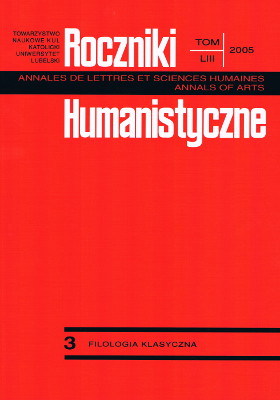The Character and Functions of Agamemnon’s Dream in Book II of The Iliad
Abstract
In Book II of The Iliad Zeus sends Oneiros, the god of dreams, to the sleeping Agamemnon, to give the Achaean leader a god’s command. He wants to cheat him in this way and to carry out Thetis’ request – to honor her insulted son. The naïve Agamemnon believes the forecast that he is going to immediately capture the Trojan town. He tries the morale of his warriors ordering them to return to their native country, and then he sends them to the deciding battle that costs the life of many of them. This is the result of the dream that Homer calls “fatal”.
During the night visit the sleeping Agamemnon is completely passive; there is no dialog between him and the god sent to him, that is Oneiros. The dream is factual, objective, and it does not require interpretation. It has a divine character, and Olympic Zeus is its author – it is he that the visit of the apparition depends on. It is the only deceptive dream in The Iliad and The Odyssey, sent in order to deceive the dreaming one, to bring him to ruin. This is its basic function.
References
Dodds E. R.: Grecy i irracjonalność, przeł. J. Partyka, Bydgoszcz 2002.
Dowden K.: [Rec.:] Lieshout R. G. A. van, Greeks on Dreams, Utrecht 1980, „Classical Review” 32 (1983), s. 282.
Erp Taalman Kip A. M. van: The Gods of the Iliad and the Fate of Troy, „Mnemosyne” 53 (2000), s. 385-402.
Fernández Contreras M. A.: Los sueños en Homero y Apolonio de Rodos, „Habis” 33 (2002), s. 9-37.
Griffin J.: Homer on Life and Death, Oxford 1980.
Grimal P.: Słownik mitologii greckiej i rzymskiej, Wrocław 1990.
Jong I. de: A Narratological Commentary on the Odyssey, Cambridge 2001.
Kessels A. H. M.: Studies on the Dream in Greek Literature, Utrecht 1978.
Kirk G. S. (ed.), The Iliad. A Commentary, vol. I: books 1-4, by G. S. Kirk, Cambridge 1985; vol. III: books 9-12, by B. Hainsworth, Cambridge 1993; vol. VI: books 21-24, by N. Richardson, Cambridge 1993.
Knox R., Russo J.: Agamemnon’s Test. Iliad 2.73-75, „Classical Antiquity” 8 (1989), s. 351- 358.
Latacz J.: Funktionen des Traums in der antiken Literatur, [w:] T. Wagner-Simon, G. Benedetti, Traum und Träumen. Traumanalysen in Wissenschaft, Religion und Kunst, Göttingen1984, s. 10-31.
Mac Donald D. R.: Does the New Testament imitate Homer? Four cases from the Acts of the Apostles, New Haven–London 2003.
Messer W. S.: The Dream in Homer and Greek Tragedy, New York 1918.
Minchin E.: The Sleeplessness Theme at Iliad 24, 1-18. A Study of Function and Form, „La parola del passato” 40 (1985), s. 269-275.
Morris J. F.: ‘Dream Scenes’ in Homer. A Study in Variation, „Transactions of the American Philological Association” 113 (1983), s. 39-53.
Oświecimski S.: Zeus daje tylko znak, Apollo wieszczy osobiście. Starożytne wróżbiarstwo greckie, Wrocław 1989.
Reid S.: The Iliad: Agamemnon’s Dream, „American Imago” 30 (1973), s. 33-56.
Theological Dictionary of the New Testament, ed. G. Kittel, G. Friedrich, transl. and ed. by G. W. Bromiley, Grand Rapids, Mi. 1964.
Tkacz M.: Sztuka przekonywania w poematach Homera, „Terminus” 1 (2002), s. 51-67.
Walde Ch.: Die Traumdarstellungen in der griechisch-römischen Dichtung, Munich–Leipzig 2001.
Copyright (c) 2005 Roczniki Humanistyczne

This work is licensed under a Creative Commons Attribution-NonCommercial-NoDerivatives 4.0 International License.





